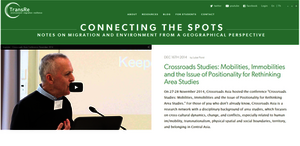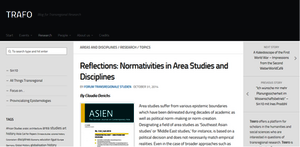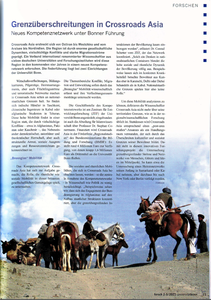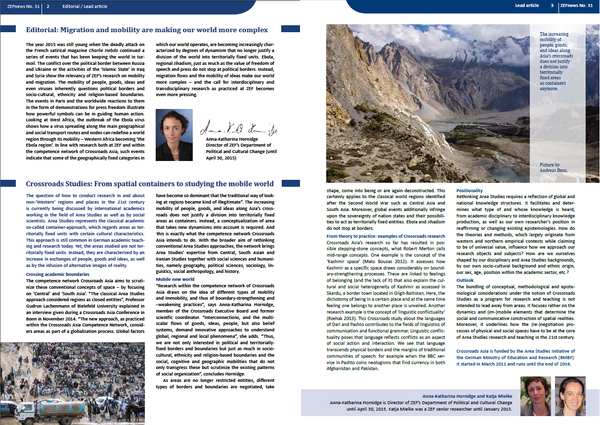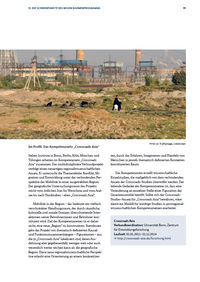Crossroads Asia in the Media
Since its inception in 2011, the competence network Crossroads Asia has become an integral part of the rethinking area studies landscape in Germany and beyond. Through numerous encounters with other researchers and networks, at external academic events as well as local and international Crossroads Asia events, the network has had the opportunity to participate in and shape the debate surrounding contemporary area studies, contributing to the process with its own vision. Here are some examples of how other networks and institutes in similar fields of research describe and position Crossroads Asia and its work.
Connecting the Spots: Notes on Migration and Environment from a Geographical Perspective
"It is clear that we at TransRe are particularly interested in Crossroads Asia’s work on human mobility, especially with regard to engendering border crossings, porosity of boundaries, and ultimately transnational connections – or translocal ones. Crossroad Asia’s stance that the constructed territorial division of the world is no longer easily applicable very much corresponds with basic assumptions of translocality: People’s mobility patterns have changed, people are permanently transcending and transgressing boundaries, which renders such fixed borders obsolete. (...)" Continue reading here.
By Luise Porst, published on 16 December 2014.
TRAFO. Blog for Transregional Research
Reflections: Normativities in Area Studies and Disciplines
"While both of these scholarly currents conceive of areas as entities existing beyond geographical proximity, they are not as radical in their departure from the geographical notion as the third current is. Herein, scholars are urged to rethink area studies epistemologically, to avoid thinking in container entities (such as that of “nation-state”), and to focus on the mobility patterns and communicative processes of human interaction. As such, we can call this the rethinking current. Reasoning that South Asia, as a case in point, may sometimes be more visible in the United Kingdom than in India or Pakistan, this current supports the concentration on sociospatial relations rather than geographically defined areas. Crossroads Asia, for instance, is a research network prominently representative of this current in Germany. According to this network, the necessity to rethink areas studies lies in the fact that there is no longer a tight coherence between physical and cultural space (...)" Continue reading here.
By Claudia Derichs, published on 31 October 2014.
Blog by Forum Transregionale Studien.
"Forsch" - die Bonner Universitäts-Nachrichten
Grenzüberschreitungen in Crossroads Asia Neues Kompetenznetzwerk unter Bonner Führung
"Um die Mobilität analysieren zu können, definieren die Wissenschaftler Crossroads Asia nicht mehr über seine territorialen Grenzen, wie es in der regionalwissenschaftlichen Forschung üblich ist. Stattdessen wird Crossroads Asia entsprechend eines ´post-area studies´-Ansatzes als ein Handlungsraum verstanden, der sich durch das Überschreiten kultureller und sozialer Grenzen seiner Bewohner bildet. Damit steht in diesem innovativem Forschungsprojekt die Untersuchung grenzübergreifender Ströme und Netzwerke im Mittelpunkt."
Hier weiterlesen.
Nr. 2-3/2011, herausgegeben vom Dezernat 8 - Hochschulkommunikation im Auftrag des Rektorats der Rheinischen Friedrich-Wilhelms-Universität Bonn.
ZEF News. In Focus: Water and Environment in a Mobile World
Crossroads Studies: From spatial containers to studying the mobile world
"Crossroads Asia’s research so far has resulted in possible stepping-stone concepts, what Robert Merton calls mid-range concepts. One example is the concept of the ‘Kashmir space’ (Mato Bouzas 2012). It assesses how Kashmir as a specific space draws considerably on boundary- strengthening processes. These are linked to Feelings of belonging (and the lack of it) that also explain the cultural and social heterogeneity of Kashmir as assessed in Skardu, a border town located in Gilgit-Baltistan. Here, the dichotomy of being in a certain place and at the same time feeling one belongs to another place is unveiled." Read more here.
By Anna-Katharina Hornidge and Katja Mielke.
Published April 2015 by Center for Development Research (ZEF), University of Bonn.
Das Rahmenprogramm Geistes-, Kultur- und Sozialwissenschaften. Forschung für die Gesellschaft von morgen
Im Profil: Das Konpetenznetz "Crossroads Asia"
"... Ziel des Kompetenznetzes ist es daher nicht eine neu ´Region´ zu konstruieren. Stattdessen geht das Projekt von thematisch definierten Kausal- und Funktionszusammenhängen - Figurationen - aus, die in ´Crossroads Asia´ lokalisiert sind, deren Ausdehnung aber gegebenfalls weniger weit oder auch wesentlich weiter reichen kann als die geographische Region."
März 2014, S. 15, herausgegeben vom Bundesministerium für Bildung und Forschung.
Blogroll
TransRe: Connecting the Spots. Notes on Migration and Environment from a Geographical Perspective.
TRAFO. Blog for Transregional Research
The Other Image. Visual Ethnography
Sapiens. Anthropology/Everything Human
Committing Sociology. Random Acts of Sociology and Phylosophy
The COMPAS Blog - Center on Migration Policy and Society
Terrain.org - A Journal of the Built + Natural Environments

